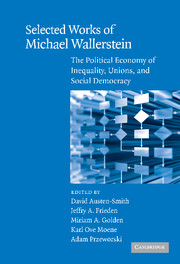 Selected Works of Michael Wallerstein
Selected Works of Michael Wallerstein Published online by Cambridge University Press: 27 January 2010
Introduction
The central dilemma of social democratic thought today concerns the promise and the threat of freer markets. In the social democratic view, markets are mechanisms that simultaneously generate an efficient allocation of resources and an inegalitarian distribution of rewards. Of course, market outcomes are efficient only under restrictive conditions that rule out externalities, significant increasing returns to scale, monopoly power, and so forth. Nevertheless, the current consensus on the advantages of freer markets in ever-broader realms that encompasses most of the political spectrum from Right to Left belies the qualifications of economic theory. It is relatively easy for parties without egalitarian commitments to embrace policies of market liberalization. Social democrats are more conflicted. In order to reap the efficiency gains that markets make possible, must social democrats abandon their traditional commitment to mitigating the inequalities of wealth and income that markets engender?
This paper addresses this general question in the context of the taxation of income from capital and the liberalization of financial markets. The increased international integration of financial markets is commonly perceived as one of the most important changes in the world economy over the past twenty years. Exports and imports of capital have grown at twice the rate of trade in goods since 1980. During the past decade, financial markets have been liberalized in Japan, Italy, France, New Zealand, Norway, Sweden and Denmark, i.e. in most of the advanced industrial societies that had significant regulatory controls over capital flows (OECD, 1989).
To save this book to your Kindle, first ensure [email protected] is added to your Approved Personal Document E-mail List under your Personal Document Settings on the Manage Your Content and Devices page of your Amazon account. Then enter the ‘name’ part of your Kindle email address below. Find out more about saving to your Kindle.
Note you can select to save to either the @free.kindle.com or @kindle.com variations. ‘@free.kindle.com’ emails are free but can only be saved to your device when it is connected to wi-fi. ‘@kindle.com’ emails can be delivered even when you are not connected to wi-fi, but note that service fees apply.
Find out more about the Kindle Personal Document Service.
To save content items to your account, please confirm that you agree to abide by our usage policies. If this is the first time you use this feature, you will be asked to authorise Cambridge Core to connect with your account. Find out more about saving content to Dropbox.
To save content items to your account, please confirm that you agree to abide by our usage policies. If this is the first time you use this feature, you will be asked to authorise Cambridge Core to connect with your account. Find out more about saving content to Google Drive.